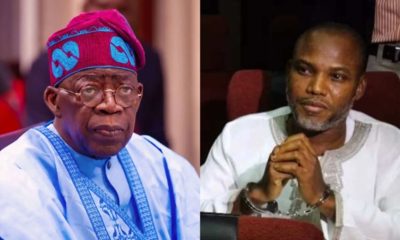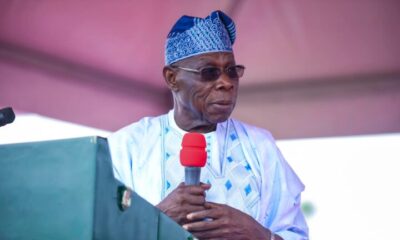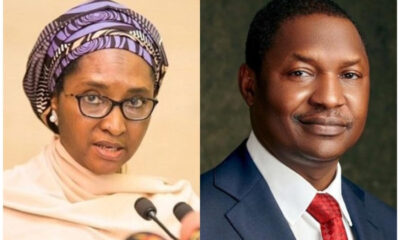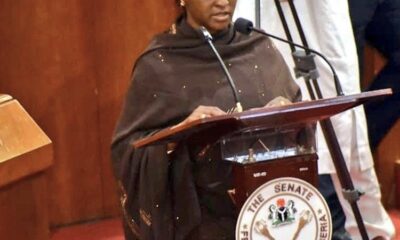Business
FG considering fresh borrowing from IMF – Finance minister

The Federal Government is considering tapping into the newly created fund by the International Monetary Fund (IMF) to cater for its urgent financial needs, Minister of Finance, Budget and National Planning, Zainab Ahmed, has said.
She gave the indication on the sidelines at the ongoing IMF- World Bank meetings on Wednesday in Washington.
Many people including National Assembly members have expressed concern that the country might be approaching a debt trap its total debt standing at N42.84 trillion ($103,31bn) as of June this year.
The minister also said the FG had been engaging financial institutions to look into the country’s portfolio debt to restructure and further stretch the debt service period to give more fiscal relief.
“It is a fact that Nigeria’s debt has increased over the last three to four years, and this increase in debt was occasioned by the different kinds of exogenous shocks that the country faced, which are not unique to Nigeria,” she said.
“The last drawing we had from the IMF is the second round of special drawing rights (SDRs) that was provided for all the member countries. The IMF recently offered a food security package that countries can draw, and it is equivalent to about 50 per cent of their SDRs.
“We have not taken a decision to draw on that. We have to examine the requirements, terms and conditions, to see if it will be safe for us to draw because we don’t want to be drawn into an IMF programme.
“If they work for us, we will now decide to take it because the funds can certainly be useful in terms of adding to our reserves and coping with the challenges the country is facing.”
She said there were signs that the recent flooding in the country would cause more stress to the food system, affecting harvest and prices.
“The floods that have been happening are going to cause more stress on our food system. We realise that the floods are currently destroying crops and therefore the harvest that is expected will be much less, and it will mean that more of our people will struggle to afford food,” she added.
Ahmed also said the Federal Government plans to use up to 65 per cent of government revenues next year to service debt.
She said the government would scale back on some tax incentives and expand the tax net to ramp up domestic revenue.
The minister said, “Unfortunately, the cost of debt service is rising because of the rising interest rate globally, resulting in higher debt service costs. Our projection from the debt sustainability analysis is that Nigeria is able to cope with its debt service.
“We have been engaging financial institutions to look at the opportunity to restructure our debt to further stretch the debt service period to give us more fiscal relief. Those are some of the things we want to achieve in this meeting.
“Also, what we are doing is to ramp up domestic revenue mobilisation. There are so many different aspects that we are looking at, including cutting down on tax expenditure taxes, furniture, waivers, incentives that are being provided to encourage businesses.”
IMF Director of Research Department, Pierre-Olivier Gourinchas, advised low-income countries to progress toward debt restructuring to avert sovereign debt crises.
Gourinchas said many low-income countries were close to or already in debt distress and should urgently consider improving their liquidity buffers, including by requesting access to precautionary instruments from the Fund.
He said, “Countries should also aim to minimise the impact of future financial turmoil through a combination of preemptive macroprudential and capital flow measures, where appropriate, in line with IMF’s Integrated Policy Framework.
“There are clouds on the horizon, but progress on climate policies, debt resolution, and other targeted global issues will demonstrate that strengthened cooperation can achieve progress for all and help to overcome geoeconomic fragmentation.”
Business
Naira opens 2025 on weak note against US dollar

Naira opens 2025 on weak note against US dollar
The Nigerian naira fell to N1,541.36/$ on the first trading day of 2025, marking a 0.36% decline from the closing rate of N1,535.82/$ recorded at the end of 2024, according to NFEM data on the Central Bank of Nigeria’s website.
Some authorised dealers quoted the dollar at N1,545/$, a slight improvement from the N1,550/$ quoted earlier in the week. Others quoted the naira at N1,520/$ at the close of trading on Thursday.
In the parallel market, the naira ended the day at N1,655/$, improving from N1,670/$ quoted on Tuesday.
The naira’s performance in 2024 saw a significant depreciation of 40.9% compared to its official rate of N907.11/$ at the close of 2023.
READ ALSO:
- 2025 sends off 2024 and its baggage of rubbish
- Jealous husband stabs Bishop to death over allege affair with wife
- Police arrest couple over alleged rape, assault of minor
The decline comes despite various foreign exchange policies introduced by the Central Bank of Nigeria (CBN) to improve market transparency and attract foreign investors.
One of the notable reforms was the December launch of the Electronic Foreign Exchange Matching System, which introduced new guidelines for authorised forex dealers. This initiative brought some stability to the naira towards the end of 2024.
Meanwhile, in the money market, the Nigerian Interbank Offered Rate saw declines across all maturities, indicating liquidity in the banking sector. The Open Repo Rate dropped by 0.61% to 26.69%, while the Overnight Lending Rate fell by 0.55% to 27.25%.
Trading in the secondary market for Federal Government of Nigeria (FGN) bonds remained subdued, resulting in a marginal increase in the average yield to 19.76%. In the sovereign Eurobonds market, buying pressure across various segments of the yield curve led to a 6-basis-point decline in the average yield to 9.62%.
Naira opens 2025 on weak note against US dollar
Auto
Jetour attributes Nigeria’s award to customers loyalty, innovation

Jetour attributes Nigeria’s award to customers loyalty, innovation
Jetour has been declared the fastest growing auto brand in Nigeria.
The award was announced on Wednesday December 11, 2024 in Lagos at an impressive ceremony organised by the Nigeria Auto Journalists Association (NAJA).
Jetour representative in Nigeria, Jetour Mobility Services, has taken to its Facebook page to celebrate its customers for making this to happen, attributing the success to its commitment to innovation in creating remarkable driving experiences.
Jetour known for its luxury offerings is one of China’s most revered auto brands, a marque of Chery Holding Group established in 2018.
It mainly produces crossovers and Sports Utility Vehicles (SUVs).
The recognition of Jetour as the Fastest Growing Auto Brand in the country is coming about a year after its introduction into the Nigerian market.
Jetour arrived in Nigeria in the last quarter of last year. And the SUVs available for this market are X70 – Liberty, X70 Plus – Elegance, X90 Plus – Cruise and Dashing.
Chairman of the NAJA Awards Organising Committee, Mr Theodore Opara, said despite being new in the Nigerian market, the brand was quickly able to secure a prominent place for itself in the highly competitive industry and received considerable attention from new car enthusiasts.
The committee, he added, had no difficulty in picking the brand as the fastest growing in the Nigerian auto market.
The name “Jetour” is a combination of the word “jet” and “tour”, which according to the automaker signifies a “convenient journey”. And its models try to depict this connotation in designs and performance.
Jetour Mobility Services said it considered the award a great honour, adding that it was a validation of its commitment to innovation and creating remarkable driving experiences.
The firm celebrates the award on its Facebook page with the following comments:
“We’re honoured to be named the Fastest Growing Auto Brand of the Year at the prestigious NAJA Auto Awards, powered by the Nigeria Auto Journalists Association.
“This achievement is a testament to our commitment to innovation, quality, and creating unforgettable driving experiences.
“A huge thank you to our amazing customers and everyone who has been a part of the journey — your trust propels us forward! Cheers to more milestones ahead!”
Jetour says its focus is to be a leader in mobility as well as provide reasonable travel solutions for individuals and families.
Its goal is to provide an excellent vehicle that demonstrates individuality for today’s young people, it adds.
As in the global market, the brand users in Nigeria are said to be an uncompromising group of individuals, unwilling to settle for less.
Jetour is not only winning in Nigeria, it is also a toast of a section of the Saudi market. One of its models, Dashing, recently won the Best Midsize Crossover Award for 2023-2024.
National Automotive Supply Company, the authorised distributor of Jetour vehicles in the Kingdom of Saudi Arabia, announced that the new and advanced Jetour Dashing won the “Best Midsize Crossover” award during the awards ceremony of the 11th edition of the “PR Arabia National Automotive Award” in Saudi.
Jetour Dashing was announced as the winner at the ceremony held in mid-November in Jeddah under the patronage of the Saudi Automobile and Motorcycle Federation and in the presence of several princes and VIPs, as well as representatives of regional offices of automotive brands.
Business
NNPC rejected Dangote $750m offer to manage Nigeria’s refineries, days Obasanjo

NNPC rejected Dangote $750m offer to manage Nigeria’s refineries, days Obasanjo
Former President Olusegun Obasanjo has disclosed that the Nigerian National Petroleum Corporation (NNPC) rejected a $750 million offer from billionaire businessman Aliko Dangote.
In an exclusive interview with Channels TV, former President Olusegun Obasanjo revealed that in 2007, Dangote offered a staggering $750 million to manage the Port Harcourt and Kaduna refineries.
Obasanjo explained that the Nigerian National Petroleum Corporation (NNPC), now rebranded as NNPCL, rejected the offer due to its inability to operate the refineries effectively.
READ ALSO:
- Why I persuaded Tinubu to reject Yar’adua’s finance minister offer – Senator Ojudu
- Fubara replies Wike: Odili right face, image of Rivers
- Why smoking cigarettes, taking alcohol not sins – Pastor Damina
He said, “Aliko got a team together and they paid $750m to take part in PPP (Public–public-private partnership) in running the refineries.
“My successor refunded their money and I went to my successor and told him what transpired. He said NNPC said they wanted the refineries and they can run it. I now said but you know they cannot run it.
“But I was told not too long ago that since that time, more than $2 billion have been squandered on the refinery, and they still will not work,” he added
NNPC rejected Dangote $750m offer to manage Nigeria’s refineries, days Obasanjo
-

 metro2 days ago
metro2 days ago‘Deepen Shariah knowledge to curb misinformation’
-

 metro2 days ago
metro2 days agoIlorin: Retired works controller murdered on New Year’s Day
-

 metro1 day ago
metro1 day agoTinubu’s refusal to honour Seyi’s pact with us disappointing – Nnamdi Kanu’s family
-

 metro1 day ago
metro1 day agoJealous husband stabs Bishop to death over allege affair with wife
-

 Politics3 days ago
Politics3 days agoHow Tinubu outsmarted Buhari to become president – Ojudu
-

 metro3 days ago
metro3 days agoHorror in Ogun as twin brothers kill, dismember sex worker
-

 metro20 hours ago
metro20 hours agoMosques should be research centres – Varsity don
-

 metro9 hours ago
metro9 hours agoYouths beat Osun monarch for appointing Imam on disputed community













